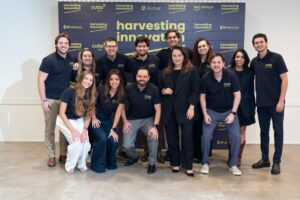Paris-based venture capital firm, Sofinnova Partners, has financed and accompanied almost 500 companies during its 45-year existence, including some in and around the agtech scene. Most recently the firm invested in AgroSavfe, a Belgian agro-biotech company that is developing a new generation of biopesticides. The firm has been investing in biotech innovation since 2009, making it one of the first to do in Europe, according to Joško Bobanović, partner at the firm.
“We’re one of the oldest VC companies in Europe and have been investing in startups and new technologies for a very long time,” said Bobanović. “As such, we think we understand how this business works.”
The company certainly has a good track record generally and is now getting to grips with the ‘different’ challenges associated with the renewable chemicals and industrial biotech space.
“Since we entered this sector we’ve invested in 10 different

companies,” said Bobanović. “Our interest started with BioAmber in October 2009 and runs right through to AgroSavfe, which was added in the last few months,” he said. “BioAmber is now all grown up and is publicly traded with a commercial plant of its own. AgroSavfe is obviously at the other end of the process.
“All our experiences to date, however, are allowing us to build expertise in how to grow companies in this space from the lab through pilot to demonstration plant, and then to a commercial plant, with all the technical and business steps that requires.
“For the moment we have stayed away from making direct investments into fuels, preferring to invest more in enablers to fuel technologies, such as MetGen in Finland, which produces industrial enzymes for use in ethanol or other biofuels production, or Comet Biorefining which produces cellulosic sugars that can be fermented into ethanol. We have not invested directly into fuels because we find it difficult to find a very cheap product with volatile fuel prices.”
While being crystal clear about what they will and will not invest in, Sofinnova is very enthusiastic about the potential of the biochem industry.
“Our general thesis is that the chemical industry is not innovating enough, even though its customers are looking for innovation to achieve new performance,” said Bobanović. “This can come from new technologies and new ways of making chemical molecules, a challenge on which we’re now focusing following the recent first closing of our €106 million ($113 million) Industrial Biotech Fund investment fund, which is dedicated to this sector,” he added. “We’re now looking for 8-10 start-ups to invest in and grow throughout a period of 10 years.”
Asked to assess the mood of investors at present, Bobanović highlighted the two-sided nature of the VC world; first VCs must attract investors and then they need to find ‘interesting target companies’ in which to invest.
Biotech is not yet old enough to be able to show clear investment returns for would-be investors, as might apply to IT or healthcare, for example, he added.
“The investors we can attract today see a promise in this space and commit primarily to projects because they believe in the team we’ve put together,” he said. “Convincing them can be quite a long road, however, even though we have managed to find an excellent mix of people; some of whom are from an industry background and believe in this space for the long term and some who have a strategic interest in biotech and are looking to learn how to start very early with an innovation and build a company over time.
“You also have to be willing to collaborate within the biotech ecosystem. This is not a single, isolated industry. You need to cooperate with forestry, agriculture, chemicals, big brands, institutions and so on. There’s a lot of work to do before an investment takes off.
“We look for businesses that are at a relatively early stage in their development. We’re definitely not afraid of a technical challenge that we do need to understand if we’re to be able to manage an investment properly.
“We will invest in companies that still have technical things to prove, however, being prepared to help them build the technical and business side of their program as they go along.”
So, what about the end-game; the commercial plant stage where big money is needed to finish the job — certainly bigger than the VC sector is usually interested in, or able to satisfy?
“One of the issues is that this is a new field and not fully proven,” said Bobanović. “This is different from other more established industries. As a result, innovators in the biotech space may need to grow all the way to a commercial plant size; proving they can produce something at an interesting cost and that they can also sell it.
“You don’t see this in other areas of innovation, where you don’t have to be an investor of scale to be acquired. The challenge for biotech, from a finance point of view, is to go further into the maturity of the company. Because these processes are new, people can be skeptical. There’s also sometimes a degree of inertia about the chemical industry, which doesn’t want to get involved too early in a new development.
“When you need $80m, $100m or even $150m to build a factory, and you have to find a way to finance that, you have to resort to creativity in these sort of situations.
“Avantium, for example, which is one of our companies, recently went public with an IPO with a view of co-financing a commercial unit. BioAmber also took the public route while Comet Biorefining is addressing its requirements by teaming up with its suppliers.
“Government-linked incentives may also help in some cases. Significant competition can develop in certain geographies where there’s a public desire to attract these kinds of factories to a specific jurisdiction for job and future revenue reasons. As I said, be creative.”
Finally, what’s the Sofinnova view on Brexit and the potential fall-out for investors from the process of the UK leaving the EU?
“Three of our companies are in the UK,” said Bobanović, “so the question does impact us. The key initial issue for these companies is whether they will have access to EU funding or not in the future. That is currently an unresolved question.
“After that, the competitive point for the UK will concern whether or not these companies can remain in the UK or will they, because of a bigger market or easier access to free or cheap money, move to the continent. Big questions certainly.”





